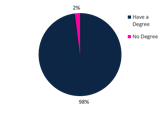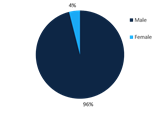Why choose us?
Our site is a goldmine of information and support. So, whether you're an employer or a candidate, why not pop over to our advice section to help you get the most from the recruitment process.

World’s Top CEOs - How To Get There?
Becoming CEO of one of the biggest businesses in the world can net you millions of pounds a year, no wonder why everyone wants to make it to the top. According to Glassdoor data, the average CEOs annual income is around £9.5 million a year1.
We’ve looked into the Chief Executive Officers of the biggest 100 companies in the world by revenue2 to discover what really makes a top CEO and how they’ve made it to where they are.
Key Findings of Our Study
We've summarised the main conclusions of our study into the top 100 CEOs in the world below:
- To become CEO of one of the biggest businesses in the world you may need to be internally promoted - the average 'top CEO' has worked at their respective company for 25 years. Out of the CEOs we reviewed, only 25% had worked at their business for less than 15 years and the majority of CEOs in our study have worked at their company between 20 and 40 years.
- The majority of 'top CEOs' are at the end of their career - the average CEO in our study is 59 years old, with 42/100 of the CEOs reviewed being between 56 and 60 years old. Only 4 of the 'top 100 CEOs in the world' are below the age of 50.
- CEOs tend to have a career background in finance or operations roles - grouping the career backgrounds of the CEOs reviewed into concise categories, 54% had a background in operations or finance.
- You need to be a graduate to become CEO of a multi-national business and an MBA definitely helps - 98% of the top 100 CEOs are graduates with 36% of these CEOs studying a business related degree and 23% completing an engineering course. 25% of the 98 CEOs with degrees have also completed a Masters in Business Administration (MBA).
- The 'gender divide' is obviously prevalent for those working in CEO roles - 96 out of the 100 CEOs we reviewed are male, only 4 of the world's biggest businesses by revenue have female CEOs.
The full results of our study are discussed in the article below, with our data sources also available at the bottom of the page.
How Long Has Each CEO Worked at Their Respective Company?
The average 'top CEO' has worked at their company for 25 years - suggesting that if you want to be the leader of one of the biggest businesses in the world, there is inevitably some element of 'working your way up'.
We've broken down the length of time that the CEOs we reviewed have worked at their chosen company into groupings below:
| Duration of Employment at Company | Count of CEOs (out of 88) |
|---|---|
| 1 to 5 years | 9 |
| 6 to 10 years | 5 |
| 11 to 15 years | 8 |
| 16 to 20 years | 10 |
| 21 to 25 years | 13 |
| 26 to 30 years | 11 |
| 31 to 35 years | 11 |
| 36 to 40 years | 11 |
| 41 to 45 years | 6 |
| 46 + years | 4 |
Out of the time groupings, the most common length of employment for a CEO at their respective company was 21 to 25 years, which arguably makes sense as company's which turn over billions of pounds a year will look for a leader that knows their business in-side out.
This is backed up by the fact that two of the least common age groupings were working at the company for 1-5 years and 6-10 years - implying that to make it to the top of one of these businesses, you probably need to have worked in that company for at least 15 years.
How Old is The Average Top CEO?
The top 5 CEO age groupings can be seen below:
Average CEO age: 59
Out of the 96 CEOs whose age was publicly available, by far the most prominent age range was between 56 and 60 – accounting for 42% of the CEOs reviewed.
Generally, the most powerful CEOs are over the age of 50, with only 4 people in our study being below this age. The youngest ‘Top CEO in the World’ is John Elkann, 41, CEO of EXOR, an Italian investment company.
The oldest CEO in the top 100 is Warren Buffett, 87, of Berkshire Hathaway.
The full age breakdown can be seen below:
| Age Range | Count of CEOs |
|---|---|
| 35-40 | 0 |
| 41-45 | 3 |
| 46-50 | 3 |
| 51-55 | 15 |
| 56-60 | 40 |
| 61-65 | 23 |
| 66-70 | 8 |
| 71-75 | 1 |
| 76-80 | 2 |
| 81-85 | 0 |
| 86-90 | 1 |
Education of the Most Influential CEOs
Of the top 100 CEOs in the World, 98 have a degree, proving that there’s an undisputable link between your education and how far you can progress. From our study the majority of CEOs are educated beyond undergraduate level, with many of the top performers earning masters or doctorate degrees.
Looking at each CEOs highest level of study, we’ve also broken down our results into the most popular degree subjects:
CEO’s Degree Subjects
Unsurprisingly, the majority of the CEOs we reviewed studied business, with 33 of the 90 CEOs with accessible degree information completing a business-related course. A further 25 of these CEOs studied an MBA (Master of Business Administration), by far the most popular route of study.
The full results of education by degree subject can be seen below:
| Degree Type | Count of CEOs |
|---|---|
| Business | 33 |
| Engineering | 21 |
| Economics | 10 |
| Accounting & Finance | 9 |
| Computer Science | 4 |
| Law | 3 |
| Medicine | 2 |
| Politics | 2 |
| Physics | 2 |
| Psychology | 1 |
| Linguistics | 1 |
| Liberal Arts | 1 |
| English | 1 |
CEO Gender Breakdown
In 2018, only 4 out of the 100 top companies in the world have CEOs who are female. These 4 CEOs are Ginni Rometty of IBM, Isabelle Kocher of ENGIE, Gail Koziara Boudreaux of Anthem and Mary T. Barra of General Motors.
Professional Background of the Top CEOs
We have reviewed the career history of 74 of the top 100 CEOs with easily accessible career information. From this data we have grouped CEOs into different professional backgrounds, our definitions of these groupings can be seen at the end of the article:
The majority of CEOs have spent their career prior to becoming a Chief Executive in either Operations or Finance roles.
The full results of this part of our study can be seen below:
| Professional Background | Count of CEOs |
|---|---|
| Operations | 21 |
| Finance | 19 |
| R & D | 10 |
| Data Analysis | 8 |
| Sales | 6 |
| Engineer | 6 |
| Marketing | 4 |
Conclusions
Looking into the results of our study, the most obvious CEO correlations come from age and gender. 76% of the World’s top 100 CEOs are male and between the age of 50 and 65.
Our results also suggest that it is near impossible to become an influential CEO without a degree and that you are far more likely to make it to the top if you have an MBA.
Finally, working throughout your career in a finance or operations role is likely to give you a greater chance of becoming a CEO. Arguably this makes sense as those in the highest positions of a multinational business need to know the nuts and bolts of how that company actually works, from cashflows and supply chains to how business activity is actually conducted.
References
1) https://www.glassdoor.com/research/ceo-pay-ratio/
2) The ‘biggest 100 companies in the World’ is based on the 100 companies with the largest revenue in 2017: https://www.forbes.com/global2000/list/3/#header:revenue_sortreverse:true
Professional Background Grouping
Operations - Involved in project management, internal process design or supply chain management.
Finance - Involved in managing, reviewing or auditing a company's finances and assets.
R&D - Involved in designing or innovating a company's products or services
Data Analysis - Working in an analytical role for the majority of their career.
Sales - Primarily working in roles selling businesses products or services.
Engineering - 'Hands-on' roles improving and maintaining technical systems in the public or private sector.
Marketing - Roles in business branding or promoting a company's products or services.
About The Research
Research on the CEOs came from a range of sources, mixing Wikipedia data with reports from publications and outlets to collate the first career moves and education of the world’s most powerful CEOs.
We welcome use of our data in other studies or articles. Please reference Aaron Wallis Sales Recruitment and www.aaronwallis.co.uk as the author of the study.
Our Services
Revised and Re-published: 3rd March 2021

Search jobs
With hundreds of jobs available, now is the time to look for your perfect position
Recruit sales staff
Just fill in your details below to get started

by Rob Scott
Managing Director

About the author
Rob Scott

